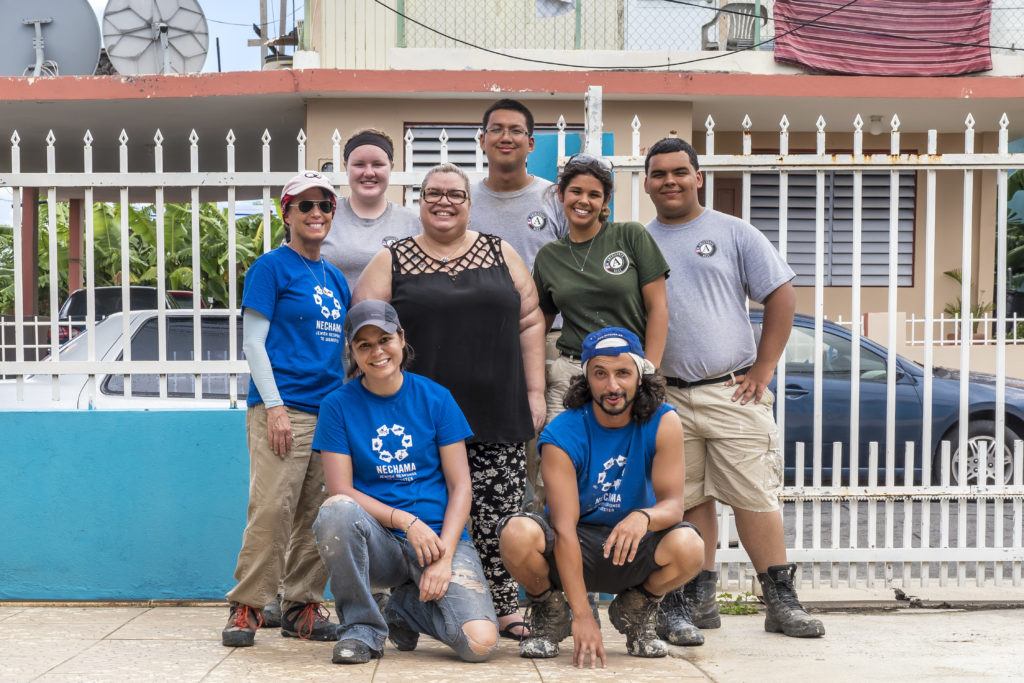After months of work, the NECHAMA Board of Directors ratified updated organizational values at their Board Meeting on September 19th, 2019. The values build upon our history and work – highlighting our foundation in seven core Jewish values that guide the organization to this day.
- Mipnei Darchei Shalom – Building Relationships – מפני דרכי שלום
The Talmud[1] teaches that the Jewish community is obligated, not only to help and care for Jews, but to help and care for everyone.[2] The scholar Maimonadies took this teaching one step further and taught that it is in fact a commandment to come to the aid of the non-Jewish community. Wherever there is a need, NECHAMA provides support, whether it’s a Jewish community or not. We make no distinction when we respond to meet urgent humanitarian needs on behalf of the greater Jewish community. - Gemilut Chasadim – Acts of Lovingkindness – גמילות חסדים
Jewish tradition has long emphasised the importance of gemilut chasadim, doing voluntary acts of lovingkindness or service for others. The collection of proverbs known as the Ethics of the Fathers teaches that “the world rests upon three things: Torah, prayer, and gemilut hasadim/acts of lovingkindness.”[3] When we respond to a disaster as NECHAMA, we are truly performing acts of lovingkindness and in so doing, bring God’s presence into the world. - Tzedekah – Charity/Justice – צדקה
The root of the Hebrew word tzekekah means justice and is required of each of us. The Jewish tradition requires that we each share what we have with those who have less. The community is obligated to ensure that everyone has food, clothing, and shelter. We are asked to give generously not only of our money, but also of our time and talent to make the world better. When NECHAMA assists a family, we are helping to fulfill the vital commandment found in the Torah: justice, justice you shall pursue!”[4] - Ahavat Orchim – Love The Stranger – אהבת אורחים
The most repeated commandment in the Torah is to care for the poor, the widow, and the stranger — to love and care for those who are the most vulnerable. When we work with NECHAMA to rebuild the home of someone who was once a stranger, that person becomes part of our lives and we embody what the Torah teaches when it commands us to care for the poor, the widow, and the stranger. - Lo Ta’Amod – Don’t Stand Idly By – לא תעמוד
We are commanded “not stand idly by the blood of our neighbor.”[5] The Talmud interpreted this verse as an obligation to come to the aid of others. Even if there is a risk to our own lives, we must respond to aid another. For us at NECHAMA, we come to the aid of others in distress; we do not stand idly by — rather we respond rapidly and with passion to assist our neighbors in need. - Rachamim – Compassion – רחמים
The Talmud teaches that one of the most vital of Jewish values is rachamim, compassion – a caring concern for others.[6] At NECHAMA, we approach each of our interactions with our clients, our coworkers, and community members with rachamim, with genuine compassion and a caring concern for others. - Tikkun Olam – Repairing The World – תיקון עולם
We don’t have to look beyond the morning headlines or the evening news to see the brokenness in our world. The Jewish answer to that brokenness has always been action – to do what we can to repair it. When NECHAMA rebuilds a home, we are not just repairing a home, we are repairing the world.
